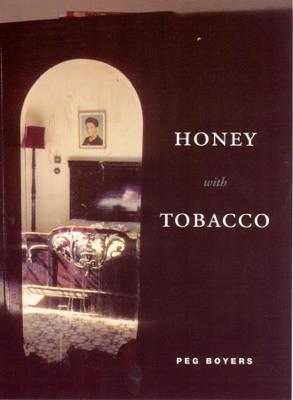Phoenix Poets (CHUP)
2 total works
"Pieta" - This time the migraine came with a vision bathed in night sweat: I was sitting on the Eames chair, your man's body on my lap, legs and arms white as casein draped over mine, spilling onto the cassock, new sores on your legs, dried blood on your feet and hands, from your chalk mouth the words forgive me, from mine, the impossible no. "Hard Bread", Peg Boyers' debut poetry collection, with verse spoken in the imagined voice of the Italian writer Natalia Ginzburg, was widely praised for its inspired ventriloquism and its brilliant lyricism. In "Honey with Tobacco", Boyers' own intensely personal voice emerges in three strikingly distinctive variants. The first part of the book is the most explicitly autobiographical, bringing together poems that explore the poet's Cuban American experience and a childhood marked by travel, the tropics, and varieties of disenchantment. The middle sequence of poems concerns a mother, a father, and a son, a postmodern holy family whose ordeals are evoked in a terse, terrifying narrative.
In familiar tableaux drawn from the Bible that have inspired great works of art - the "Annunciation", the "Pieta", and "Judgment Day" - Boyers explores what it means in contemporary America to be "blessed among women" and whether and how art can contain grief. The final section of the book confronts age, desire, and regret in a series of personal poems that plumb baser human instincts and the speakers' determination to dwell in darkness, when necessary, without abandoning the sacred.
In familiar tableaux drawn from the Bible that have inspired great works of art - the "Annunciation", the "Pieta", and "Judgment Day" - Boyers explores what it means in contemporary America to be "blessed among women" and whether and how art can contain grief. The final section of the book confronts age, desire, and regret in a series of personal poems that plumb baser human instincts and the speakers' determination to dwell in darkness, when necessary, without abandoning the sacred.
Rialto Invisible in this cheap night scene of the familiar bridge the lives - the lies - we lived on both sides of the canal, invisible the water's stench at low tide, the rotting debris beneath the picture-perfect surface, invisible the adjacent market still smelling of fish and ammonia, its slime of scales adorning the ground, invisible, too, in this souvenir print, the inevitable rat crouched under the pilaster, his throat quivering benignly in the moonlight, the silvery glow a local specialty: filth disguised as ornament. To Forget Venice is the improbable challenge and the title of Peg Boyers's newest collection of poems. The site of several unforgettable years of her adolescence, the place she has returned to more frequently than any other, the city of Venice is both adored and reviled by the speakers in this varied and unconventionally polyphonic work.
The voices we hear in these poems belong not only to characters like the mother of Tadzio (think Death in Venice), or the companion of Vladimir Ilych Lenin, or the Victorian prophet John Ruskin and his wife, Effie, but also to wall moss, and sand, and - most especially - an authorial speaker who in 1965, at age thirteen, landed in Venice and never quite recovered from the formative experiences that shaped her there. Ranging over several stages of a life that features adolescent heartbreak and betrayal, marriage and children, friendship and loss, the book insistently addresses the author's desire to get to the bottom of her obsession with a place that has imprinted itself so profoundly on her consciousness.
The voices we hear in these poems belong not only to characters like the mother of Tadzio (think Death in Venice), or the companion of Vladimir Ilych Lenin, or the Victorian prophet John Ruskin and his wife, Effie, but also to wall moss, and sand, and - most especially - an authorial speaker who in 1965, at age thirteen, landed in Venice and never quite recovered from the formative experiences that shaped her there. Ranging over several stages of a life that features adolescent heartbreak and betrayal, marriage and children, friendship and loss, the book insistently addresses the author's desire to get to the bottom of her obsession with a place that has imprinted itself so profoundly on her consciousness.

